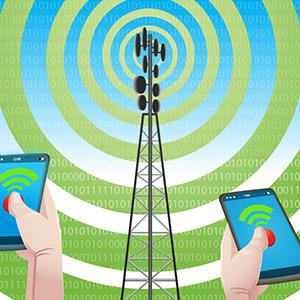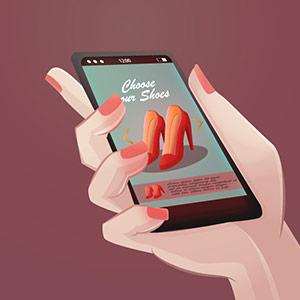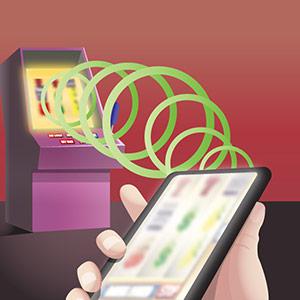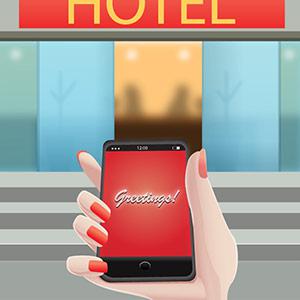A beacon is a device use to send out signals or warnings. A hilltop defense outpost would light a fire as a signal beacon which could be seen for miles, warning of encroaching enemies, and a lighthouse served as a shoreline beacon to warn approaching ships that land was near. These days, casino beacons are used as digital communication devices with the potential to change marketing forever.
iBeacon and Eddystone

Enter Apple. With the introduction of iBeacon, the concept of proximity marketing was born. Using the power of Bluetooth applications, a small iBeacon device uses the Bluetooth low energy protocol to serve as a geo-marker. When a smart device with a compatible app gets within proximity of the iBeacon, it triggers messages, check-ins on social media, and push notifications. When set up as a network, iBeacon devices comprise of a geo-fence surrounding an entire area.
Enter Google. Google has implemented its own type of beacon; Google Eddystone, named after Eddystone Lighthouse in the UK. Google’s version uses the concept of simplicity of the one-way signal broadcast by a lighthouse. The most common use for Eddystone is in the Google Maps application.
Many service providers use iBeacon or Eddystone in their own devices, and offer apps for both iPhones and Android devices, making the beacon system useable by most smartphone owners. Beacons themselves do not send messages to customers, they merely act as a marker to signal activity within their proximity. Businesses using beacons use this data to send offers via players’ smartphones, but only according to the preferences the customer has selected and authorized.
Marketing Uses

The unique identifiers transmitted by iBeacon devices provide unprecedented access to consumer data and preferences. This enables businesses to establish more personalized relationships with their customers on a one-on-one basis. Whenever a customer enters a store, for example, that store can offer the customer special promotions, deals, and rewards, right to their smartphone. Beacons are more effective in enclosed spaces than GPS, which makes them a perfect marketing tool for larger areas such as casinos.
Casino Beacons in Action

Casinos using beacons have the ability to track customers based on their playing habits, offer them exclusive bonuses, and recommend new games based on previous player behavior. VIP players gain loyalty points and offer specific to their gaming class, and new players receive enticing offers. VIP players can be greeted by name and offered their favorite drink by casino staff. This type of personalized treatment is especially appealing to loyal players. New players receive information on how to become a VIP member, including special instructions, offers, and discounts.
The most valuable aspect of casino beacons is how they provide valuable data about the amount of time players spend at certain games. This includes data about each game table, including betting limits, jackpot amounts, and available seats at each table. This information is then processed and passed onto players to inform and motivate them into taking action.
Casino Beacons as Navigation
Casino beacons offer valuable navigation services as well. Beacons installed at critical locations within a casino can direct players to key areas of the casino. New players can be guided to smoking areas, restaurants, hotel rooms, and specific gaming rooms and card tables. This is especially valuable for promotions, as time-critical offers are very effective in driving consumer behavior. An impersonal coupon sent in an email is random. However, if a customer walking by a casino bar receives a 2-for-1 drink offer at that exact bar, this is a very relevant and tempting offer.
Beacons can be set up for VIP rooms, poker tables, roulette wheels, and slot machine areas. Players can even order drinks in the app and have them delivered with ease. The best part of the casino beacon network is that it can be as small or as large as the casino itself.
Just as a casino visitor is greeted upon arrival, they can also be sent special offers when they are about to leave the casino. Data based on player preferences in gaming can be used to offer them deals which they can’t refuse – which is a valuable tool for retaining customers. If a casino is part of a chain, it can send special offers to its customers to encourage them to visit their other casinos. In addition to offers within the casino, players can enjoy offers when they are departing, such as Uber or a taxi service.
Casino Hotel and Resort Beacons

In addition to greeting players and leading them to the key areas of the casino, the beacon network is especially useful in casino hotels and resort areas. The hotel desk can provide express service to visiting players; no more forms to fill out. Hotel room beacons can also grant keyless room access to VIP players, and recommend room service specials or announce special offers in hotel restaurants.
In the case of larger casino resorts, customers can be directed to each of the star attractions, bars, restaurants, and entertainment areas. Casinos can also offer entertainment options for the whole family, from spa treatments for the ladies to free rollercoaster rides for the kiddies.
Casino beacons hold the potential to streamline the relationship between casinos and gamers. They provide consistent and priority services to VIP players and offer them bonuses, rewards, and benefits unavailable to anyone but them. They also serve up valuable data on the gaming behavior of all players, new and seasoned, in order to provide the perfect customer experience.
Beacons Everywhere
Plans are already in motion to implement beacons on a universal scale. The National Emergency Address Database has developed a system which tracks all Wi-Fi access points and Bluetooth beacons in the United States. The FCC can use this information and dispatch it to 911 emergency first responders, with the aim to provide floor level and room level access. This critical information can be used to locate survivors in a burning building, or heart attack and stroke victims. The time saved in locating the victims in large buildings will result in saved lives as well.
Beacons are not yet in widespread use. Security and privacy concerns have slowed wholesale deployment of any type of beacon system to date. But technology advances nonetheless. In the end, it comes down to how much information we choose to share about ourselves and how much control we have over that information.




